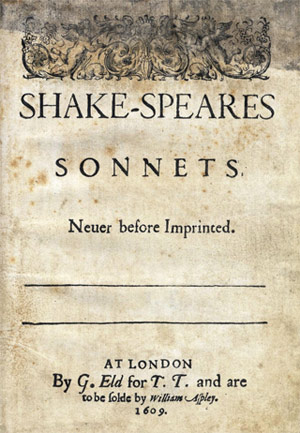Sonnet XVIII:

BASIC FACTS:
Title: Sonnet XVIII.
Author: William Shakespeare.
Date of composition: 1590s.
Date of publication: 1609. Shakespeare’s sonnets were first published by Thomas Thorpe without the consent of the author.
Collection: Sonnets.
Poetic genre: Sonnet.
Metric: Poem composed according to the English or Shakespearean sonnet scheme: 14 iambic pentameters divided into three quatrains and a final couplet.
Rhyme: The rhyme pattern is the following: ABAB CDCD EFEF GG.
FURTHER INFORMATION:
Major Themes:
The main theme in this sonnet is the paradox of time. Within the time topic we find others such as youth and fading beauty; time gives you beauty when you are young but youth lasts very little and time takes beauty from you. Another theme that we find is literature as a minor form of immortality; it appears as a way to defeat time.
Symbols:
- Summer represents youth in this poem, it is the best season of the year and of life but it is too short and then comes the winter, which in life means to become old and die.
- The sun gives life but it is so hot that it can kill. It is another example of the paradox of time: what gives you life kills you.
- Time gives you everything and then takes it away.
- Beauty declines: symbol of the passage of time.
- Nature’s changing course: everything changes, inexorability of time.
Literary devices:
- Anaphora:
And often is his gold complexion dimm'd;(l.6)
And every fair from fair sometime declines, (l.7)
Nor lose possession of that fair thou owest;(l.10)
Nor shall Death brag thou wander'st in his shade (l.11)
So long as men can breathe or eyes can see, (l.13)
So long lives this and this gives life to thee (l.14)
- Metaphor:
Sometime too hot the eye of heaven shines (l.5)
The “eye of heaven” stands for the sun which gives life but is so hot that can kill you.
Summer is a metaphor of youth, it is too short and leads to the winter, but thanks to these verses the youth of the beloved will be eternal. We can find examples in verses 4 and 9:
And summer's lease hath all too short a date (l.4)
But thy eternal summer shall not fade (l.9)
- Rhetorical question:
Shall I compare thee to a summer’s day? (l.1)
- Synecdoche:
So long as men can breathe or eyes can see, (l.13)

Sources:
Mabillard, Amanda. An Analysis of Shakespeare's Sonnet 18. Shakespeare Online. 2000. 14 May 2012 <http://www.shakespeare-online.com/sonnets/18detail.html>.



